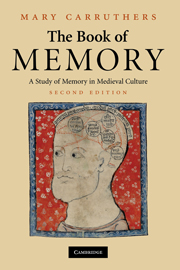Book contents
- Frontmatter
- Contents
- List of Illustrations
- Preface to the second edition
- List of Abbreviations
- Introduction
- CHAPTER 1 Models for the memory
- CHAPTER 2 Descriptions of the neuropsychology of memory
- CHAPTER 3 Elementary memory design
- CHAPTER 4 The arts of memory
- CHAPTER 5 Memory and the ethics of reading
- CHAPTER 6 Memory and authority
- CHAPTER 7 Memory and the book
- Appendix A
- Appendix B
- Appendix C
- Notes
- Bibliography
- Index of manuscripts
- General Index
Preface to the second edition
Published online by Cambridge University Press: 05 January 2014
- Frontmatter
- Contents
- List of Illustrations
- Preface to the second edition
- List of Abbreviations
- Introduction
- CHAPTER 1 Models for the memory
- CHAPTER 2 Descriptions of the neuropsychology of memory
- CHAPTER 3 Elementary memory design
- CHAPTER 4 The arts of memory
- CHAPTER 5 Memory and the ethics of reading
- CHAPTER 6 Memory and authority
- CHAPTER 7 Memory and the book
- Appendix A
- Appendix B
- Appendix C
- Notes
- Bibliography
- Index of manuscripts
- General Index
Summary
Preparing a wholly new edition of work first undertaken more than twenty years ago has offered me an opportunity to rethink, recast, correct, and generally reassess the conclusions I offered in 1990. It is a task that carries mixed rewards. I have resisted my initial temptation to rewrite the entire thing from the beginning – this book cannot be started again. Published some eighteen years ago, translated entirely or in part into several other languages, and cited in many contexts by scholars with a great diversity of interests, it has a life of its own now and my control over it is limited. So the book begins as it did before, and the general ordering of the materials is unchanged. But each sentence and note has been reconsidered. I hope this has resulted in greater correctness in the translations and citations, increased felicity of style and clarity of presentation. I have also, however, updated the content when new scholarship has made old conclusions untenable. And I have added material to some of my analyses, reduced some discussions, and expanded others. The images selected for reproduction are somewhat different. I have also updated the notes and bibliography, to incorporate translations and editions that have appeared since I did my original research, and scholarly discussions that have matured over the past dozen years.
I wrote in 1989 that The Book of Memory was to be the first of three. It seemed an audacious promise at the time, but in fact it turned out to be truthful. The Craft of Thought (1998) examined an earlier medieval period, and focused even more particularly on the inventive and creative nature of recollection as it was cultivated in the practices of monastic reading and composition. An anthology of English translations of many of the medieval texts that had proved important in this history, The Medieval Craft of Memory, followed in 2002, prepared with my good friend Jan Ziolkowski, a consummate scholar of medieval Latin, and with the keen participation as translators and annotators of several members of his medieval Latin literature seminar.
- Type
- Chapter
- Information
- The Book of MemoryA Study of Memory in Medieval Culture, pp. ix - xivPublisher: Cambridge University PressPrint publication year: 2008



